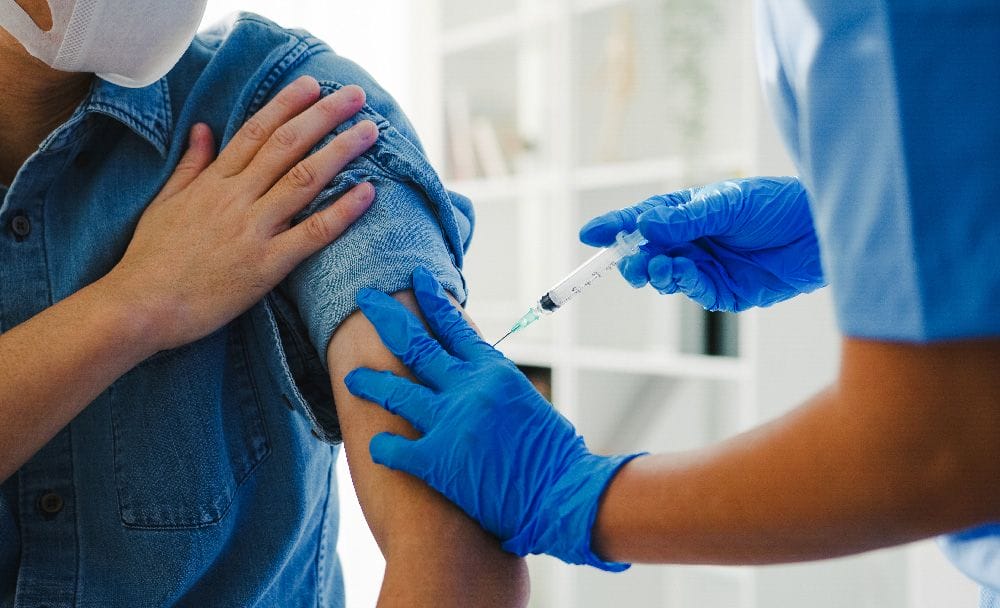Reviewed by Dr. Vipin Bihari Sharma
Typhoid is a febrile illness caused by the bacterium Salmonella Typhi. It is considered a Pitta-Kapha disorder in Ayurveda, where the digestive fire (Agni) becomes impaired, leading to the accumulation of toxins (Ama) in the body. In this article, we will provide an overview of typhoid, including its causes, symptoms, and treatment options, with references to relevant scientific literature. [1]
Causes of Typhoid
Typhoid is primarily caused by the bacterium Salmonella Typhi, which is transmitted through contaminated food or water. The bacteria are typically found in the faeces of infected individuals and can contaminate food or water sources, leading to the spread of the infection. Ingesting food or water contaminated with the bacteria can lead to the bacteria entering the digestive system and causing infection.[1] [2]
In addition to contaminated food and water, typhoid can also be transmitted through close contact with an infected individual. This can occur through the faecal-oral route, such as when an infected person fails to properly wash their hands after using the bathroom and then touches surfaces or objects that others come into contact with. The bacteria can also be transmitted through contaminated objects, such as utensils or clothing, which can serve as fomites for the bacteria.[1] [2]
Risk factors for typhoid include living in or travelling to areas with poor sanitation and hygiene practices, consuming food or water from sources that are not properly treated or purified, and having close contact with infected individuals. Children, the elderly, and individuals with weakened immune systems are also at higher risk of developing typhoid.[1] [2]
Symptoms of Typhoid
The symptoms of typhoid can vary in severity and may develop gradually over a period of one to three weeks after exposure to the bacteria. Common symptoms of typhoid include:
Fever: A persistent high fever, which is also a sign of Pitta Dosha often with a characteristic pattern of rising and falling temperatures, is a hallmark symptom of typhoid. The fever may reach as high as 40°C (104°F) or higher and can last for several weeks. [3] [4]
Gastrointestinal symptoms: Typhoid can cause a range of gastrointestinal symptoms, including abdominal pain, diarrhoea, and constipation which are an indication of accumulated toxins(Ama) in the body. [3] [4]
Headaches and body aches: Many individuals with typhoid experience headaches and body aches, which can be severe and debilitating. [3] [4]
Weakness and fatigue: Typhoid can cause weakness and fatigue, and affected individuals may feel tired and lethargic. [3] [4]
Loss of appetite: Loss of appetite is common in individuals with typhoid, and they may experience a reduced desire to eat. [3] [4]
Rash: A rash, known as rose spots, may appear on the chest and abdomen of some individuals with typhoid. These rose spots are pinkish-red and fade upon pressure. [3] [4]
Other symptoms: Other symptoms of typhoid can include a dry cough, nausea, vomiting, and an enlarged spleen and liver in severe cases. [3] [4]
It is important to note that the severity and combination of symptoms can vary from person to person, and some individuals with typhoid may have mild or atypical symptoms. In some cases, individuals may become carriers of the bacteria and continue to shed the bacteria in their faeces even after recovering from the acute illness, potentially leading to the spread of the infection to others. [4]
Treatment of Typhoid
Typhoid is a serious infection that requires prompt medical attention and appropriate treatment. Treatment for typhoid typically involves antibiotics, supportive care, and sometimes hospitalization, depending on the severity of the infection and the overall health of the affected individual. [4]
Antibiotics: Antibiotics are the cornerstone of typhoid treatment, as they help to eliminate bacteria from the body. Commonly used antibiotics for typhoid include fluoroquinolones, such as ciprofloxacin and levofloxacin, and cephalosporins, such as ceftriaxone. However, the choice of antibiotics may vary depending on the local antibiotic susceptibility patterns of Salmonella Typhi in a specific geographic region. It is important to complete the full course of antibiotics as prescribed by the healthcare provider, even if symptoms improve before the course is completed, to ensure complete eradication of the bacteria and to prevent antibiotic resistance. [4]
Supportive care: Typhoid can cause dehydration and electrolyte imbalances due to prolonged fever, gastrointestinal symptoms, and poor oral intake. Supportive care measures such as oral rehydration solution (ORS) or intravenous fluids may be administered to maintain hydration and electrolyte balance. Nutritional support may also be necessary, especially in cases where there is significant weight loss and malnutrition. [4]
Hospitalization: In severe cases or in individuals with risk factors, hospitalization may be required. Hospitalization allows for close monitoring of vital signs, hydration status, and response to treatment. It may also be necessary in cases where complications such as intestinal perforation or other organ involvement occur, which may require surgical intervention. [4]
Prevention of complications: Typhoid can be associated with various complications, including intestinal perforation, gastrointestinal bleeding, encephalopathy, and other systemic complications. Prompt diagnosis and treatment of typhoid can help prevent or reduce the risk of complications. [4]
In addition to medical treatment, preventive measures are also important in managing typhoid and preventing its spread.
Ayurvedic Treatment for Typhoid
Ayurvedic treatment for typhoid focuses on balancing the aggravated doshas, eliminating toxins from the body, and boosting the immune system. The following approaches may be used:
Detoxification: Panchakarma, which is a set of Ayurvedic detoxification procedures, may be recommended to eliminate toxins from the body and improve digestion. This may include therapies such as Virechana (therapeutic purgation) or Basti (medicated enema) as per the guidance of a qualified Ayurvedic practitioner. [5] [6]
Diet and lifestyle: Following a light, easily digestible, and warm diet is recommended, including soups, cooked vegetables, rice, and lentils. Avoiding heavy, oily, spicy, and fried foods, as well as cold and refrigerated foods, is advised. Adequate hydration with warm fluids and maintaining proper hygiene practices, such as washing hands before eating, are also important.[5] [6]
Rest and stress management: Taking plenty of rest and managing stress through practices such as meditation, yoga, and pranayama (breathing exercises) can support the body’s healing process.[5] [6]
Consultation with an Ayurvedic practitioner: It is crucial to consult with a qualified Ayurvedic practitioner for a proper diagnosis and personalized treatment plan, as the treatment approach may vary depending on an individual’s constitution (Prakriti), the severity of the condition, and other factors.[5] [6]
It is important to remember however that ayurvedic treatments have to be used on top of conventional treatments and should not be used alone for the treatment of Typhoid. It is also necessary to consult a medical practitioner before opting for any of the ayurvedic drugs or medications.
Prevention of Typhoid
Prevention is a key strategy in managing typhoid and reducing its burden. Here are some important preventive measures:
Vaccination: Vaccination is an effective tool in preventing typhoid. There are two types of typhoid vaccines available: the injectable Vi capsular polysaccharide vaccine and the oral live attenuated Ty21a vaccine. These vaccines can provide immunity against typhoid and are recommended for individuals living in or travelling to areas with a high risk of typhoid transmission, healthcare workers, and individuals with close contact with typhoid carriers. Vaccination can help reduce the risk of infection and its spread, but it does not provide complete protection, and other preventive measures should be followed as well. [7] [8] [9]
Safe food and water practices: Ensuring safe food and water practices is crucial in preventing typhoid transmission. This includes consuming only properly cooked food, avoiding raw or undercooked food, especially meat and seafood, and avoiding untreated water or ice. It is important to drink only boiled or filtered water or bottled water from trusted sources and to use safe water for brushing teeth and washing fruits and vegetables. Practising good hygiene, such as regular handwashing with soap and water, especially before handling food, can also help prevent the spread of typhoid. [9] [10]
Sanitation and hygiene: Improved sanitation facilities, including safe disposal of faeces and proper sewage management, are crucial in preventing the contamination of water and food sources with bacteria. Adequate hand hygiene, proper waste disposal, and maintaining clean and hygienic living conditions can also help prevent the spread of typhoid. [9] [10]
Education and awareness: Educating communities about the importance of safe food and water practices, good hygiene, and vaccination can play a vital role in preventing typhoid. Health education programs, community awareness campaigns, and targeted interventions can help raise awareness about the risks of typhoid and promote preventive measures. [9] [10]
Screening and treatment of carriers: Carriers of Salmonella Typhi can continue to shed the bacteria in their faeces even after recovering from acute typhoid, posing a risk of transmission to others. Identifying and treating carriers through regular screening and appropriate antibiotic treatment can help prevent the spread of typhoid. [9] [10]
FAQs
1. Can individuals become carriers of typhoid even after recovering from the acute illness?
Yes, in some cases, individuals may become carriers of the bacteria Salmonella Typhi and continue to shed the bacteria in their faeces even after recovering from the acute illness. These carriers can potentially spread the infection to others through contaminated food, water, or objects. It is important to practice proper hygiene, such as thorough handwashing, to prevent the spread of typhoid and other infectious diseases.
2. How is typhoid transmitted?
Typhoid is primarily transmitted through contaminated food or water that is contaminated with the bacterium Salmonella Typhi. It can also be transmitted through close contact with an infected person or contaminated objects, such as utensils or clothing, which can serve as fomites for the bacteria.
3. What are the risk factors for typhoid?
Risk factors for typhoid include living in or travelling to areas with poor sanitation and hygiene practices, consuming food or water from sources that are not properly treated or purified, and having close contact with infected individuals. Children, the elderly, and individuals with weakened immune systems are also at higher risk of developing typhoid.
4. What are the common symptoms of typhoid?
The common symptoms of typhoid include persistent high fever, gastrointestinal symptoms such as abdominal pain, diarrhoea, and constipation, headaches and body aches, weakness and fatigue, loss of appetite, rash (known as rose spots), and other symptoms such as dry cough, nausea, vomiting, and an enlarged spleen and liver in severe cases. However, the severity and combination of symptoms can vary from person to person, and some individuals may have mild or atypical symptoms.
5. How is typhoid treated?
Typhoid is typically treated with antibiotics, supportive care, and sometimes hospitalization, depending on the severity of the infection and the overall health of the affected individual. Commonly used antibiotics for typhoid include fluoroquinolones, such as ciprofloxacin and levofloxacin, and cephalosporins, such as ceftriaxone. Supportive care measures may include oral rehydration solution (ORS) or intravenous fluids to maintain hydration and electrolyte balance, and nutritional support in cases of significant weight loss and malnutrition. Hospitalization may be required in severe cases or in individuals with risk factors, and preventive measures are also important in managing and preventing the spread of typhoid.
Conclusion
In conclusion, typhoid is a preventable and treatable disease that requires a multi-pronged approach involving individual awareness and preventive measures, improved sanitation and hygiene, vaccination, and appropriate medical care. By implementing these strategies, we can work towards reducing the burden of typhoid and improving the health and well-being of communities at risk. Remember, prevention is always better than cure, and taking preventive measures against typhoid can go a long way in safeguarding public health.
Disclaimer: This article is only for providing general information regarding Typhoid. Kindly seek the assistance of a trained medical practitioner for diagnosis and treatment before incorporating any of the mentioned remedies into your daily routine.
References:
- Typhoid (who.int)
- Typhoid fever – NHS (www.nhs.uk)
- Symptoms and Treatment | Typhoid Fever | CDC
- Typhoid Fever – StatPearls – NCBI Bookshelf (nih.gov)
- Role of Understanding Avasthaanurupa Panchakarma Chikitsa in Clinical Practice with Special Reference to Jwara | Jagadeesh Aralikatti – Academia.edu
- Role of Shamanaushadhi in Typhoid Fever – An Observational Clinical Study | Journal of Ayurveda and Integrated Medical Sciences (jaims.in)
- Protective activity of Vi capsular polysaccharide vaccine against typhoid fever – PubMed (nih.gov)
- Vaccination | Typhoid Fever | CDC
- Typhoid fever: Control & challenges in India – PMC (nih.gov)
- Prevention Tips for Travelers | Typhoid Fever | CDC




















